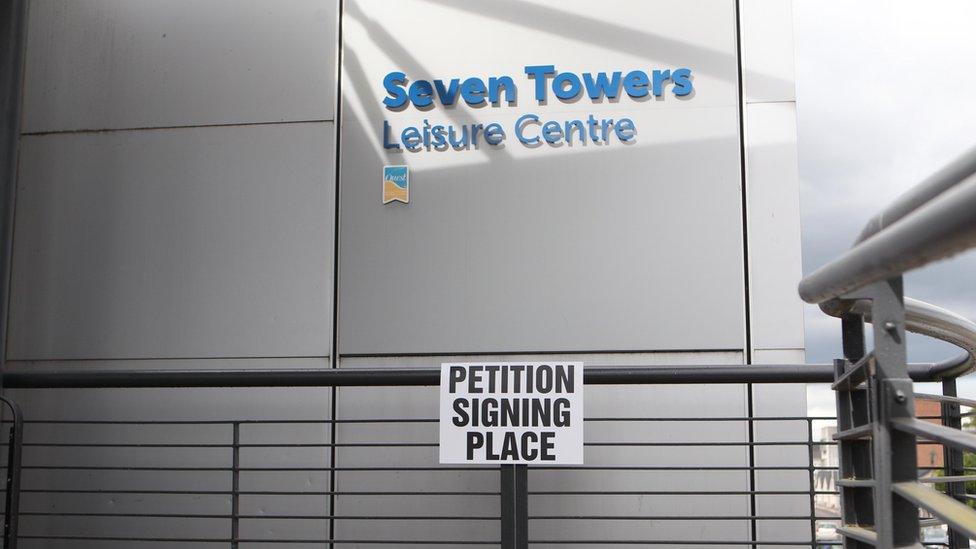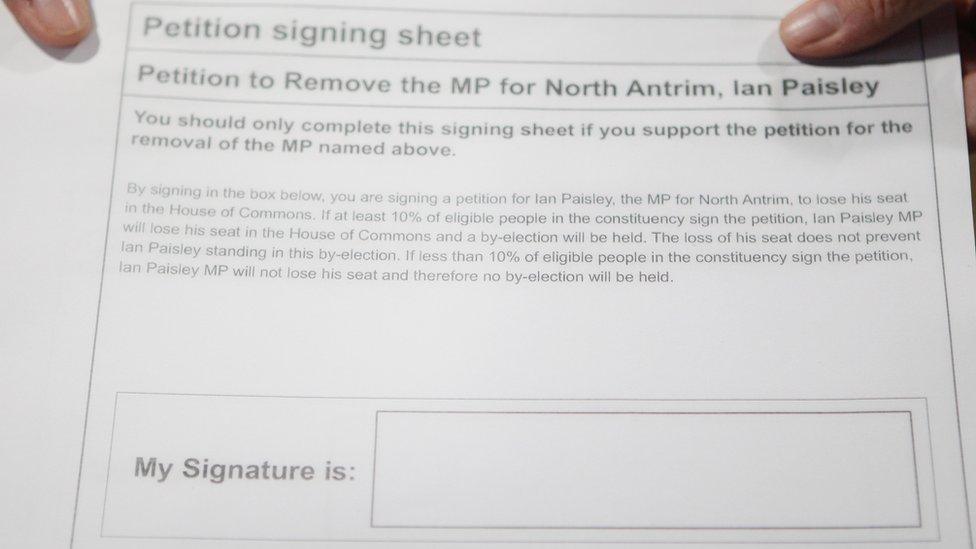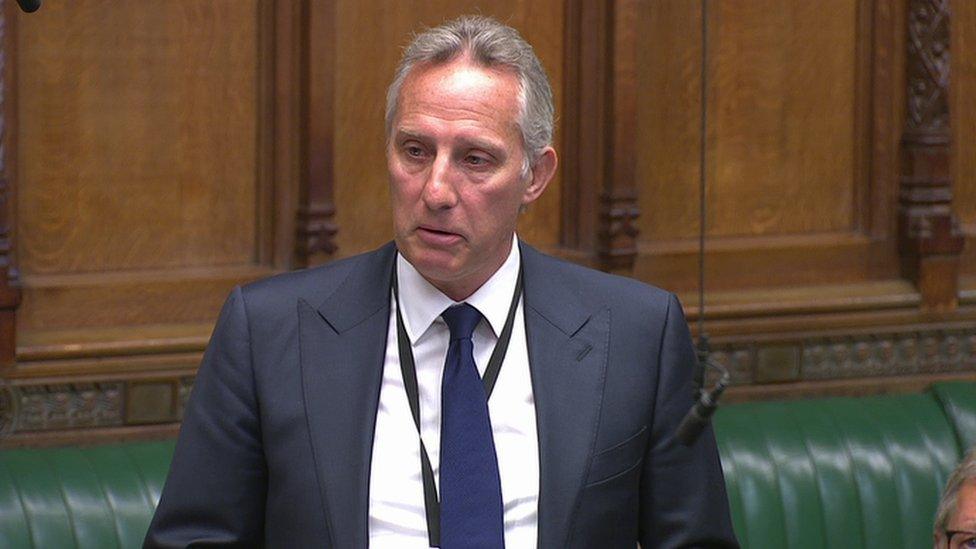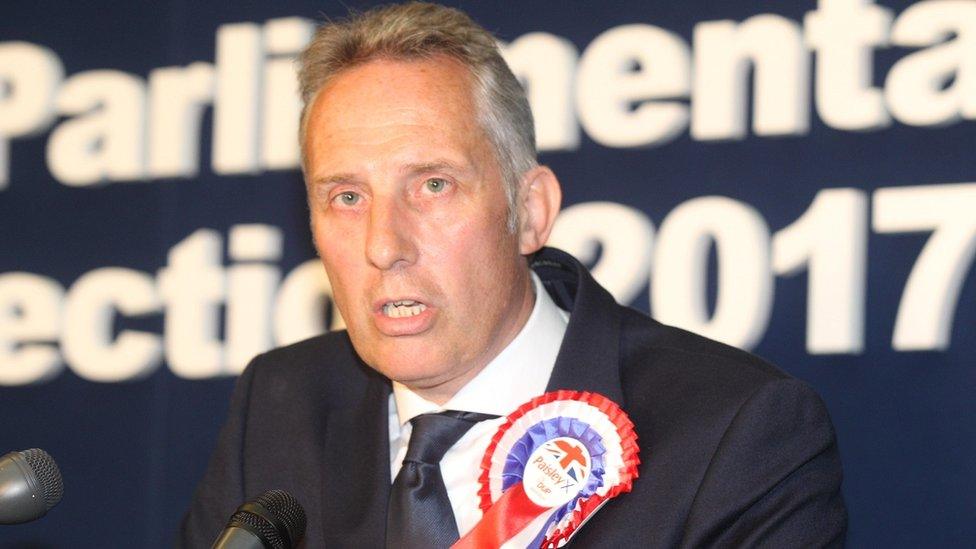Ian Paisley: North Antrim recall petition opens
- Published

Mr Paisley could lose his seat and face a by-election if 10% of voters in North Antrim sign the petition
A petition that could force a by-election in North Antrim and unseat the current MP Ian Paisley has opened.
In July, MPs voted to suspend Mr Paisley for 30 sitting days for failing to declare two family holidays paid for by the Sri Lankan government and lobbying on its behalf at Westminster - triggering the recall procedure.
The DUP MP apologised in the Commons, but will face a by-election if 10% of his constituents sign the petition.
The recall petition is the first in UK parliamentary history.
What is a recall petition?
This is a fairly recent addition to politics, becoming law under the Recall of MPs Act which came into effect in 2016.
It states that MPs who are convicted of a criminal offence and jailed, convicted of providing false information on allowance claims or barred from the House of Commons for 10 sitting days or longer can lose their seat if there is a successful petition to recall them.

The petition is open for signing for six weeks from 8 August to 19 September
Last month, Mr Paisley received a ban from Westminster of 30 sitting days for breaching parliamentary rules, beginning on 4 September, which triggered the recall procedure.
How many signatures are needed?
According to the Electoral Office for Northern Ireland (EONI), the number of people entitled to sign the petition (ie eligible registered voters) is 75,478.
The Recall of MPs Act 2015 says a petition needs 10% of that number in order to trigger a by-election, therefore 7,543 signatures are required.

It would have been 7,547 but last week the Electoral Office said the figure was 7,543 - due to a "sweep" of the register removing deceased voters and others who were not eligible.
How long is the petition open?
The petition is open for signing for six weeks from 8 August to 19 September from 09:00-17:00 BST, Monday to Friday.
Opening hours at the designated centres will be extended to 21:00 on 6 and 13 September.
Who can sign it?
Letters have already been sent to constituents informing them about the details of the petition.
Anyone wanting to sign it must live in the North Antrim constituency and be 18 years old, or have their 18th birthday before the end of the signing period on 19 September.
But just like in any normal election, anyone wanting to sign it must also be registered to vote in parliamentary elections.
Where can the petition be signed?
The Electoral Office selected three designated venues which are located at:
Joey Dunlop Leisure Centre, Ballymoney
Seven Towers Leisure Centre, Ballymena
Sheskburn House Recreation Centre, Ballycastle

The petition can be signed at three centres
Legislation allows for up to 10 locations for the petition but the electoral office has opened three, a decision which drew criticism from some political parties.
Voters can also apply to sign by post or proxy. Applications for those must be returned to the Electoral Office by 4 September.
The chief electoral officer, Virginia McVea, said there had been a change in the law in relation to the postal application so anyone who chooses not to attend in person will be able to apply for the postal option and if their details are verified, can receive it within six weeks.
Applications can be downloaded at eoni.org.uk.
There are two help lines for constituents who have queries about the process.
They are 02890446600 and 02890446668.
Will details of those who sign the petition be made public at any stage?
No. The Electoral Office has sought to reassure people that this will not happen.
In normal elections, what is known as a "marked register" is made available to the political parties afterwards.
This way, they can tell who has turned out to vote and that helps inform their campaigning for the future without giving away any information about an individual voter's particular preferences.
But the recall petition is different in as much as it is fairly obvious that if someone has turned out, it is because they think Ian Paisley should face a by-election.
With that in mind, the Chief Electoral Officer Virginia McVea has said the marked register for this recall petition will not be made available for inspection, and that maintaining the secrecy of the ballot is of "paramount importance".
The Electoral Office also said no figures will be released about the number of postal votes issued for the petition.
What happens when the petition closes?
If the number of signatures reaches or surpasses 7,543 it will trigger a by-election and Mr Paisley will lose his seat.
There would be nothing to stop him from standing in the by-election, however, and he has already indicated that he would do so.
He has been the MP for North Antrim since 2010.
- Published12 December 2018

- Published19 July 2018

- Published24 July 2018

- Published26 July 2018
